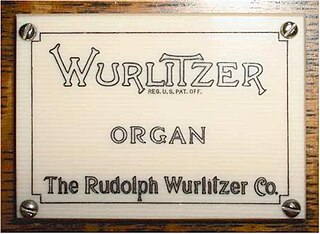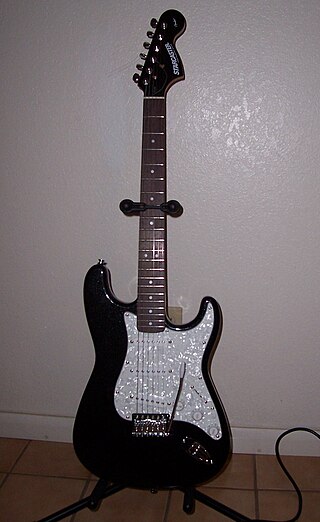
A jukebox is a partially automated music-playing device, usually a coin-operated machine, that will play a patron's selection from self-contained media. The classic jukebox has buttons, with letters and numbers on them, which are used to select a specific record. Some may use compact discs instead. Disc changers are similar devices that are intended for home use, are small enough to fit in a shelf, may hold up to hundreds of discs, and allow discs to be easily removed, replaced, and inserted by the user.

Phonograph cylinders are the earliest commercial medium for recording and reproducing sound. Commonly known simply as "records" in their era of greatest popularity, these hollow cylindrical objects have an audio recording engraved on the outside surface, which can be reproduced when they are played on a mechanical cylinder phonograph. In the 1910s, the competing disc record system triumphed in the marketplace to become the dominant commercial audio medium.

The Victor Talking Machine Company was an American recording company and phonograph manufacturer that operated independently from 1901 until 1929, when it was acquired by the Radio Corporation of America and subsequently operated as a subsidiary called RCA Victor.

A transistor radio is a small portable radio receiver that uses transistor-based circuitry. Following the invention of the transistor in 1947—which revolutionized the field of consumer electronics by introducing small but powerful, convenient hand-held devices—the Regency TR-1 was released in 1954 becoming the first commercial transistor radio. The mass-market success of the smaller and cheaper Sony TR-63, released in 1957, led to the transistor radio becoming the most popular electronic communication device of the 1960s and 1970s. Transistor radios are still commonly used as car radios. Billions of transistor radios are estimated to have been sold worldwide between the 1950s and 2012.
Saunders-Roe Limited, also known as Saro, was a British aero- and marine-engineering company based at Columbine Works, East Cowes, Isle of Wight.
Telefunken was a German radio and television apparatus company, founded in Berlin in 1903, as a joint venture of Siemens & Halske and the Allgemeine Elektrizitäts-Gesellschaft (AEG).

The Fender Musical Instruments Corporation is an American manufacturer of instruments and amplifiers. Fender produces acoustic guitars, bass amplifiers and public address equipment, however it is best known for its solid-body electric guitars and bass guitars, particularly the Stratocaster, Telecaster, Jaguar, Jazzmaster, Precision Bass, and the Jazz Bass. The company was founded in Fullerton, California by Clarence Leonidas "Leo" Fender in 1946. Its headquarters are in Los Angeles, California.

The Citroën Ami is a four-door, front-wheel drive economy (B-segment) family car, manufactured and marketed by Citroën from 1961 to 1978.

The Rudolph Wurlitzer Company, usually referred to as simply Wurlitzer, is an American company started in Cincinnati in 1853 by German immigrant (Franz) Rudolph Wurlitzer. The company initially imported stringed, woodwind and brass instruments from Germany for resale in the United States. Wurlitzer enjoyed initial success, largely due to defense contracts to provide musical instruments to the U.S. military. In 1880, the company began manufacturing pianos and eventually relocated to North Tonawanda, New York. It quickly expanded to make band organs, orchestrions, player pianos and pipe or theatre organs popular in theatres during the days of silent movies.

A knock-down kit is a collection of parts required to assemble a product. The parts are typically manufactured in one country or region, then exported to another country or region for final assembly.
Harman Kardon is a division of US-based Harman International Industries, a subsidiary of Samsung Electronics, and manufactures home and car audio equipment.

Henri Selmer Paris is a French enterprise, manufacturer of musical instruments based at Mantes-la-Ville near Paris. Founded in 1885, it is known as a producer of professional-grade woodwind and brass instruments, especially saxophones, clarinets and trumpets. Henri Selmer Paris used to be family-owned but was sold to Argos-Wityu in 2018.
Seeburg was an American design and manufacturing company of automated musical equipment, such as orchestrions, jukeboxes, and vending equipment. Prior to manufacturing their signature jukebox suite of products, Seeburg was considered to be one of the "big four" of the top coin-operated phonograph companies alongside AMI, Wurlitzer, and Rock-Ola. At the height of jukebox popularity, Seeburg machines were synonymous with the technology and a major quotidian brand of American teenage life. The company went out of business after being sold to Stern Electronics in 1982.

Australian Motor Industries (AMI) was an automobile assembly firm that was significant in the early history of the automotive industry in Australia.

The Rock-Ola Manufacturing Corporation is an American developer and manufacturer of juke boxes and related machinery. It was founded in 1927 by Coin-Op pioneer David Cullen Rockola to manufacture slot machines, scales, and pinball machines. The firm later produced parking meters, furniture, arcade video games, and firearms, but became best known for its jukeboxes.

Starcaster by Fender is a range of instruments and accessories aimed at students and beginners, marketed by the Fender Musical Instruments Corporation from the early 2000s until at least 2011. As of April 2018, no products were being marketed under this brand.
The Standel Company is an American company that makes guitar amplifiers. It was founded in 1953 by Robert "Bob" Crooks in Temple City, California. Standel was the name of Crooks' side-business of radio and hi-fi repair, located in his garage at 10661 Freer Street, Temple City, California.
Crown International, or Crown Audio, is an American manufacturer of audio electronics, and is a subsidiary of Harman International Industries, which has been part of South Korea-based Samsung Electronics since 2017. Today, the company is known primarily for its power amplifiers, but has also manufactured microphones, loudspeakers, and a line of commercial audio products, as well as digital audio networking products.

The automotive industry in Pakistan is one of the fastest-growing industries in the country, growing by 171% between 2014 and 2018. It accounts for 4% of Pakistan's GDP and employed a workforce of over 3.5 million people as of 2018. Pakistan is the 35th largest producer of automobiles. Its contribution to the national exchequer is nearly Rs. 50 billion. Pakistan's auto market is among the smallest, but fastest-growing, in Asia. 269,792 cars were sold in 2018 but declined to 186,716 in 2019 as a result of austerity measures. Pakistan used to have a lot of Japanese cars in the 1990s and early 2000s. With the launch of the first Auto Policy in 2005, Pakistan launched its very first indigenous car, Adam Revo, but after the 2008 elections the dollar started depreciating and due to bad governance a lot of automakers started to halt production, and some even exited Pakistan. At present, the auto market is dominated by Honda, Toyota, and Suzuki. However on 19 March 2016 Pakistan passed a second "Auto Policy 2016-21", which offers tax incentives to new automakers to establish manufacturing plants in the country. In response, Renault, Nissan, Proton Holdings, Kia, SsangYong, Volkswagen, FAW, and Hyundai have expressed interest in entering the Pakistani market. MG JW Automobile Pakistan has signed a memorandum of understanding (MoU) with Morris Garages (MG) Motor UK Limited, owned by SAIC Motor, to bring electric vehicles to Pakistan. NLC signed an agreement with Mercedes Benz for the manufacturing of Mercedes Actros trucks in Pakistan. Pakistan has not enforced any automotive safety standards or model upgrade policies. A few old models of vehicles, including the Bolan and Ravi, continue to be sold by Suzuki. On 8 July 2021 Jolta Electric launched the production of electric motorcycles.
Electronics World is a technical magazine in electronics and RF engineering aimed at professional design engineers. It is produced monthly in print and digital formats.












